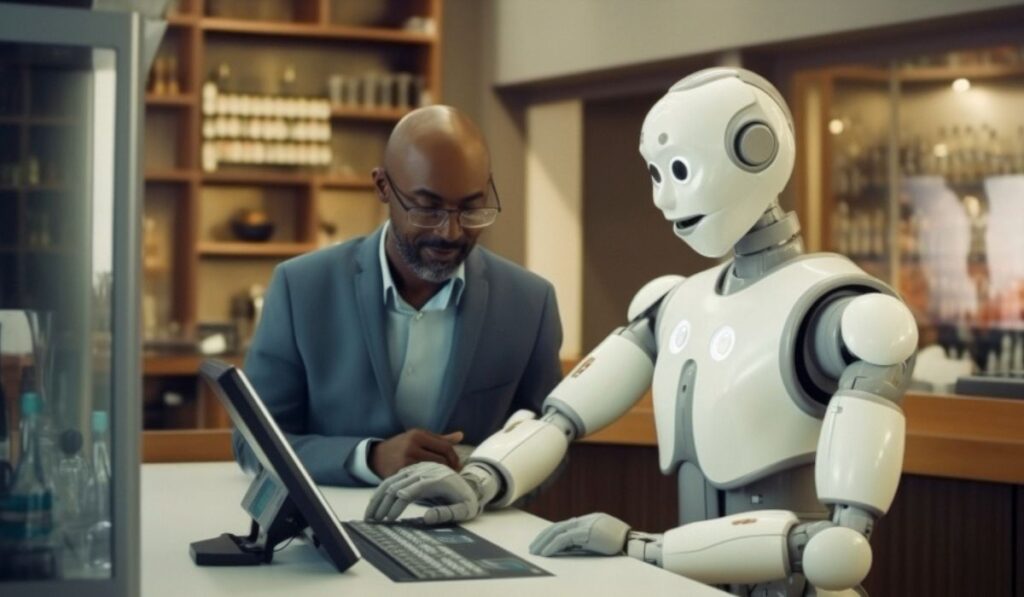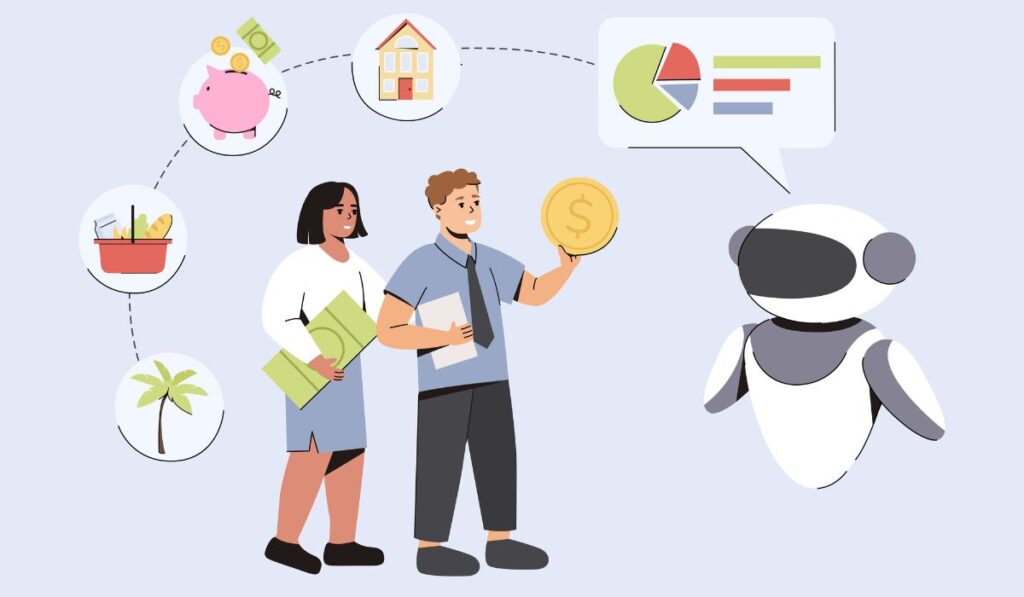The arrival of ChatGPT has caused a huge change in the field of white-collar work in today’s fast-changing digital world. ChatGPT could change standard white-collar jobs in many fields thanks to its powerful artificial intelligence techniques.
Companies and workers must grasp the significant impact of ChatGPT in white-collar workplaces amid this evolving era. ChatGPT will alter work processes and redefine professional roles across various fields, including healthcare, banking, and law.
This piece goes into great detail about how ChatGPT will make white-collar work less stable. As we look into how ChatGPT has changed the world of white-collar jobs, we can look at the possible effects, rewards, and challenges. Read on to find out about the big changes that are coming.
How ChatGPT Will Destabilize White-Collar Work?

Potential Impacts of ChatGPT on White-Collar Jobs
When ChatGPT is used in white-collar workplaces, it will likely significantly change standard job roles and processes. As businesses use ChatGPT’s advanced natural language processing features, several effects on white-collar jobs may become clear.
Automation of Routine Tasks
ChatGPT’s capacity to manage routine tasks like data entry, paperwork, and scheduling jeopardizes jobs traditionally performed by professionals. Tasks once reliant on human assistance can now be executed faster and more accurately by ChatGPT, sparking concerns about job loss.
Streamlining Workflows
White-collar jobs can get done faster with ChatGPT because it streamlines processes and cuts down on the need for physical work. This higher level of efficiency is good for productivity, but it also makes me wonder what the future holds for human workers in these fields.
Increased Efficiency
ChatGPT’s robotic features may replace human workers in administrative and office jobs, even though they make things more efficient. Organizations may rely more and more on ChatGPT to do jobs that used to be done by humans as they try to improve their operations and cut costs.
Reshaping Job Roles
Because ChatGPT is now available, white-collar jobs may need to change their job descriptions and skill sets to keep up with the times. To keep up with ChatGPT and stay competitive in the job market, workers may need to learn new skills and abilities.
Evolution of Workforce Dynamics
Businesses that use AI tools like ChatGPT are likely to change the way white-collar workers do their jobs in big ways. As companies rely more on AI-powered solutions, the usual connection between a boss and an employee may change. This could mean that hiring methods and job models change.
Job Market Disruption
ChatGPT could cause problems in the job market, which could affect people’s ability to find work and advance in their careers in those areas. Workers in roles that could be automated may have to compete harder for the jobs that are still open, but those with skills that are in high demand may find new chances.
Adaptation Challenges
It might be hard for workers to get used to using ChatGPT at work. There may need to be retraining and upskilling programs to make sure that workers can work well with AI technologies and use them to do their jobs better.
Uncertain Future
The complete impact of ChatGPT on white-collar work remains uncertain, with ongoing developments shaping its trajectory. While technology can alter work processes, it also raises questions and challenges that require resolution.
Addressing Concerns
To reduce ChatGPT’s destabilizing effect on white-collar jobs, address job loss concerns, adapt to workforce changes, and address ethical issues. Prioritize strategies to support workers and foster a tech-friendly yet ethical workplace culture.
Benefits of AI in White-Collar Work

Artificial intelligence (AI) has many perks for white-collar jobs, such as changing the way work is done and making it more efficient. When businesses use AI technologies like ChatGPT, they can get a lot of benefits that help them succeed.
Increased Efficiency
AI technologies streamline processes, enabling tasks to be completed more quickly and with less effort. ChatGPT can manage repetitive tasks such as data entry efficiently. This gives workers more time to work on more complicated and important tasks.
Cost Savings
AI solutions like ChatGPT help businesses save money on costs and make better use of their resources by handling regular chores. Businesses can cut down on the need for physical work and move resources to other parts of the company when ChatGPT handles jobs like document filing and customer service.
Improved Accuracy
AI-driven systems, like ChatGPT, reduce mistakes and flaws, making sure that work is more accurate and reliable. GPT helps businesses make smart choices and get great results by carefully looking at huge amounts of data and coming up with precise insights.
ChatGPT in White-Collar Industries – Examples

ChatGPT can be used in many white-collar fields, showing how flexible it is and how it affects professional fields. Let’s look at how ChatGPT is changing the law, financial, and healthcare fields.
Healthcare
ChatGPT helps people who work in healthcare with things like diagnosing patients, transcribing medical records, and writing up clinical notes. ChatGPT helps healthcare workers give more personalized and effective care by looking at patient data and coming up with new ideas.
Finance
ChatGPT helps financial experts and managers by giving them real-time market information, looking at data trends, and making financial reports. ChatGPT helps financial workers make smart investment choices and improve portfolio performance by automating jobs like data analysis and report writing.
Legal
ChatGPT helps lawyers and other legal workers with legal research, writing contracts, and analyzing cases. This speeds up the legal process and makes it more efficient. GPT speeds up the legal process and improves the quality of legal services by looking at case law and making legal papers.
ChatGPT & AI in White-Collar Work – Challenges and Potential Negative Effects

The integration of ChatGPT and other AI technologies into white-collar work environments poses various challenges and potential negative effects for organizations and professionals.
Job Displacement
A major concern regarding AI in white-collar jobs is its potential to replace human workers. With AI tools like ChatGPT assuming routine tasks, certain jobs may become obsolete, leading to job loss and economic instability.
Impact on Employment
AI technologies can cause people to lose their jobs, which can have big effects on society and the economy. People who lose their jobs may have a hard time finding new ones, which can cause social problems and financial problems in the areas they live in.
Reskilling and Upskilling
Companies ought to finance reskilling and upskilling initiatives to aid workers in transitioning to new roles or industries and mitigate the negative impacts of job loss. Equipping employees with training programs and educational resources enables them to adapt to evolving job market demands.
Economic Disparities
The use of AI may cause people to lose their jobs, which could make economic inequality worse, especially for weak groups like low-skilled workers and people from disadvantaged areas. Fair access to schooling, training, and job chances must be the main goal of efforts to fix these problems.
Security Concerns
When AI is employed in white-collar jobs, it exposes new security risks and vulnerabilities that companies must address. Concerns arise regarding data privacy, hacking, and intellectual property protection as ChatGPT accesses private data and autonomously generates content.
Data Privacy
For AI systems like ChatGPT to work well, they often need access to big datasets. This does, however, make me worry about data privacy and the safety of private data. Strong data security means must be put in place by organizations to prevent illegal access, data leaks, and privacy violations.
Cybersecurity Threats
Bad people can use AI systems to do bad things, like hacking them or attacking them. Because ChatGPT can make material on its own, it could be vulnerable to security risks like fake news, misleading information, and social engineering attacks. To protect themselves from these risks and online threats, organizations need to set up security rules and defenses.
Intellectual Property Protection
When AI is used in white-collar jobs, it makes people worry about how to protect intellectual property rights. The fact that ChatGPT can create material brings up issues of ownership and credit, especially in fields like news, marketing, and the creative arts.
Ethical Considerations
It is very important to think about ethics when using AI in white-collar jobs.
ChatGPT’s ability to generate human-like content raises concerns about responsibility, transparency, and bias in decision-making. To prevent harm to individuals and society, businesses must ensure honest and responsible use of AI systems.
Accountability and Transparency
AI systems such as ChatGPT operate autonomously, raising questions about accountability and decision-making. To maintain stakeholders’ trust and ensure AI systems are accountable, companies must clarify their functionality and hold them responsible for their actions.
Bias and Fairness
Bias and discrimination can happen in AI systems, which can have big effects on people and society as a whole. ChatGPT’s use of big datasets could make errors worse in areas like race, gender, and socioeconomic class. To make sure that decisions are fair and equal, organizations must take steps to find and fix bias in AI systems.
Social Impact
With so many people using AI in white-collar jobs, it could have huge effects on society. The fact that ChatGPT can create material on its own makes people worry about job loss, economic injustice, and the future of work. When organizations make decisions, they need to think about the social effects of using AI and put ethical concerns first.
Become a Superhuman at Work with ChatGPT

By using its advanced AI features, ChatGPT gives workers the tools they need to be more productive than humans. Professionals can get more done in less time with ChatGPT’s ability to respond to texts like a person and do many other jobs.
Achieve More with Less Effort
ChatGPT can handle boring tasks like answering emails, making reports, and analyzing data, so experts can spend their time and energy on more important tasks that need human knowledge. ChatGPT helps professionals work faster and better by automating tasks that they do over and over again.
The History and Current State of AI in the Workplace
AI has long been utilized in the workplace, and as technology progresses, work settings constantly change. The evolution of AI, from early systems like expert systems to recent advancements like natural language processing, profoundly affects work methods.
How Does ChatGPT Support Overall Careers?
ChatGPT improves job chances by providing many perks that help with professional growth and success. ChatGPT assists professionals in improving their job performance and achieving career objectives by simplifying processes, enhancing efficiency, and reducing the manual workload.
Frequently Asked Questions
Will ChatGPT replace white-collar jobs?
ChatGPT’s integration may automate some tasks, but it’s unlikely to fully replace white-collar jobs.
How chatbot will destabilize white-collar work?
Chatbots like ChatGPT could lead to job displacement by automating routine tasks, impacting traditional white-collar roles.
How will AI affect white-collar workers?
AI will impact white-collar workers by automating tasks, enhancing productivity, and reshaping job roles.
Which jobs will AI replace by 2030?
Jobs at risk of AI replacement by 2030 include data entry, customer service, and administrative roles.
What is the highest-paying white-collar job?
The highest-paying white-collar job varies by industry but often includes roles like surgeons, CEOs, and lawyers.
Which white-collar jobs will AI replace?
AI could replace jobs involving repetitive tasks such as data entry, customer support, and administrative duties.
Which jobs AI can’t replace?
Jobs requiring creativity, emotional intelligence, and complex problem-solving are less likely to be replaced by AI.
Conclusion
The integration of ChatGPT and AI into white-collar work marks a significant change in how professionals work. With AI’s help, professionals can boost productivity and achieve more with less effort. This technology streamlines workflows, cuts costs, and enhances accuracy, fostering career growth and success.
Moving towards a future where ChatGPT and AI are central to white-collar work presents challenges and potential drawbacks. Yet, organizations can manage these by carefully planning and strategically implementing AI solutions. As the digital landscape evolves, ChatGPT will reshape white-collar work, fostering efficiency, productivity, and dynamism.

Hey, I’m Akhtar Rasool a blogger from Lahore Pakistan who’s all about the marketing game. Reading and writing fuel my creative side, and I’ve found success in the blogosphere. Let’s connect through words and explore the exciting world where content meets strategy! 🌟








